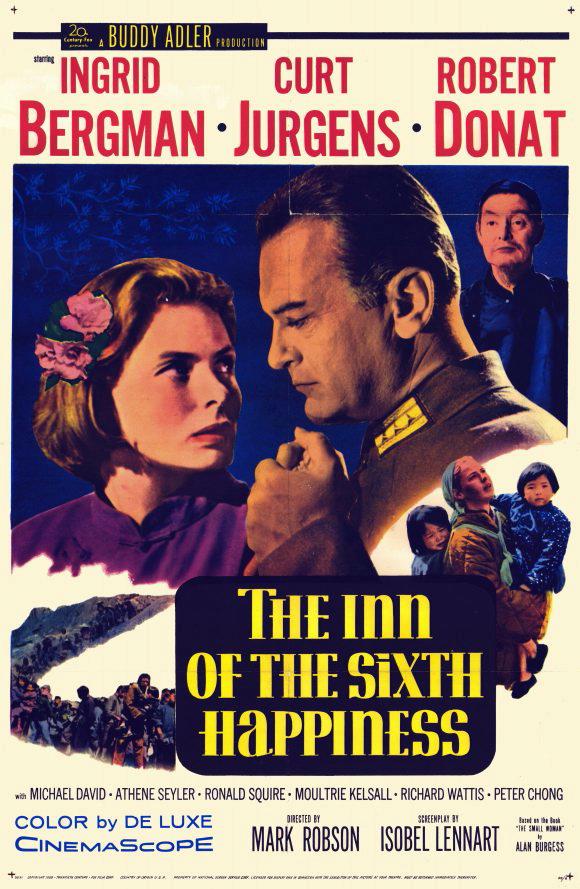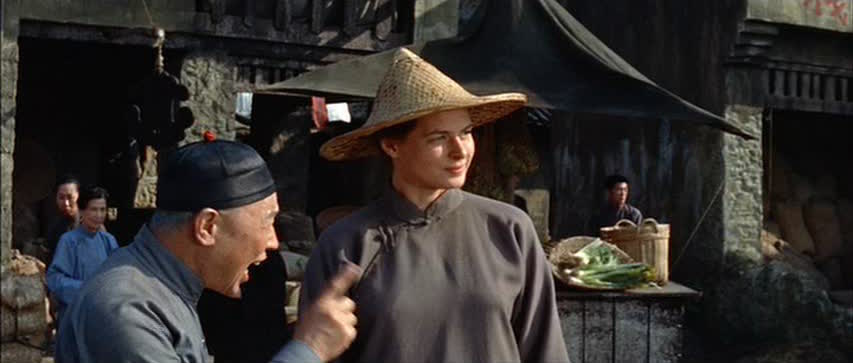Tim continues our Ingrid Bergman centenary retrospective which concludes Saturday...
 The two films Ingrid Bergman headlined in 1958 offer a splendid study in contrasts. Both are obvious attempts at image control as she re-entered the American film industry following the scandal of her out-of-wedlock pregnancy by Italian director Roberto Rossellini, and they approach that mission as differently as they could. Indiscreet, which Anne Marie just looked at, is a head-on confrontation with the scandal, humorously defusing it with satiric candor. The Inn of the Sixth Happiness, on the other hand, is a forthright piece of special pleading that we should ignore all of that unpleasantness by squashing Bergman into the role of the saintliest damn woman who could be scrounged up.
The two films Ingrid Bergman headlined in 1958 offer a splendid study in contrasts. Both are obvious attempts at image control as she re-entered the American film industry following the scandal of her out-of-wedlock pregnancy by Italian director Roberto Rossellini, and they approach that mission as differently as they could. Indiscreet, which Anne Marie just looked at, is a head-on confrontation with the scandal, humorously defusing it with satiric candor. The Inn of the Sixth Happiness, on the other hand, is a forthright piece of special pleading that we should ignore all of that unpleasantness by squashing Bergman into the role of the saintliest damn woman who could be scrounged up.
The living saint in question was Gladys Aylward, a London housemaid who became gripped by the idea that she should give up everything to move to China in her 30s to be an informal missionary and later became a national hero for her charitable work with orphans. Bergman was such a poor fit for the tiny Cockney brunette that Aylward herself openly complained about the casting, as well as just about every plot detail in a screenplay by Isobel Lennart that fairly should be counted more as a fantasia on the themes of Aylward's life than a legitimate biography. [More...]
Not that it takes knowing the extent of the film's inaccuracies and elisions to find Bergman an awkward fit with the material. By the time that Gladys leaves London, we've already gotten a rich, full sense of Bergman's unsuitability for a role that, if this movie came out 10 or 15 years later, would have Julie Andrews's name all over it.
The first of the dementedly long film's (2 hours and 38 minutes) many acts is a barbaric little sitcom of manners, in which we meet this indefatigable bundle of pluck and determination, so anxious to make her way to China that she starts a payment plan for a train ticket on the Trans-Siberian railway, to the charming bafflement of the ticket agent (Richard Wattis, giving the film what is very much its most lived-in, appealing performance).

Meanwhile, she works every free minute of every day, always with a joyous smile of optimism plastered on her face with rictus-like steadiness. That Ingrid Bergman felt joy in her life seems beyond doubt, but the way she expresses it in this film is deeply unpersuasive, and the thickness with which director Mark Robson (incongruously nominated for the film's only Oscar) manages the comedy does absolutely nothing but exacerbate the lead actress's discomfort with the material.
Eventually, the film arrives at the exotic suffering of 1930s China, and against all the expectations of that description, it becomes significantly better, though we have to deal with yellowface performances ranging from the the ungainly (Curt Jürgens as a half-Chinese, half-Dutch army captain with makeup that makes him look nothing like an Asian) to the openly horrifying (Robert Donat, who passed away before the film's premiere, as the local mandarin). Bergman as a woman plagued by doubt and fear that she refuses to express or acknowledge is a much more comfortable fit than Bergman as a peppy go-getter. So even while the Chinese sequences of The Inn of the Sixth Happiness are ribboned with shortcomings of dramatic strength and cultural decency, it's still a comfort when the film arrives at that point.

There are still sticky points in her performance: she had taken weepy romantic melodrama as far as she could by this point in her career, and when the movie requires her to look with romantic enthusiasm at Jürgens, the actress's disinterest in the subplot is hard to miss. But there's also goodness in it, when she can play the more direct nuts-and-bolts material of a woman forced to operate an inn in a country where she doesn't know the language, or the leader of a group of orphans grimly crawling across the war-ravaged countryside. There's a conflict between sweeping historical epic and face-to-face character drama that the film never resolves: not in its deeply inconsistent CinemaScope images (shot by the great Freddie Young), not in its pacing, and certainly not in Bergman's all-over-the-place performance. But when she finds the right mood for a scene, she's at least striking in her rawness. If The Inn of the Sixth Happiness didn't do much for Bergman's career renaissance (she'd only star in one theatrically-released feature in the next five years), it at least proved that she still had the movie star chops to rise above shaky material.

previously: Intermezzo (1939), Dr Jekyll & Mr Hyde (1941), For Whom the Bell Tolls (1942), 10 Best Ingrid Bergman Kisses (1935 through 1970), Notorious, (1946), Joan of Arc (1948), Journey to Italy (1954), Indiscreet (1958)
